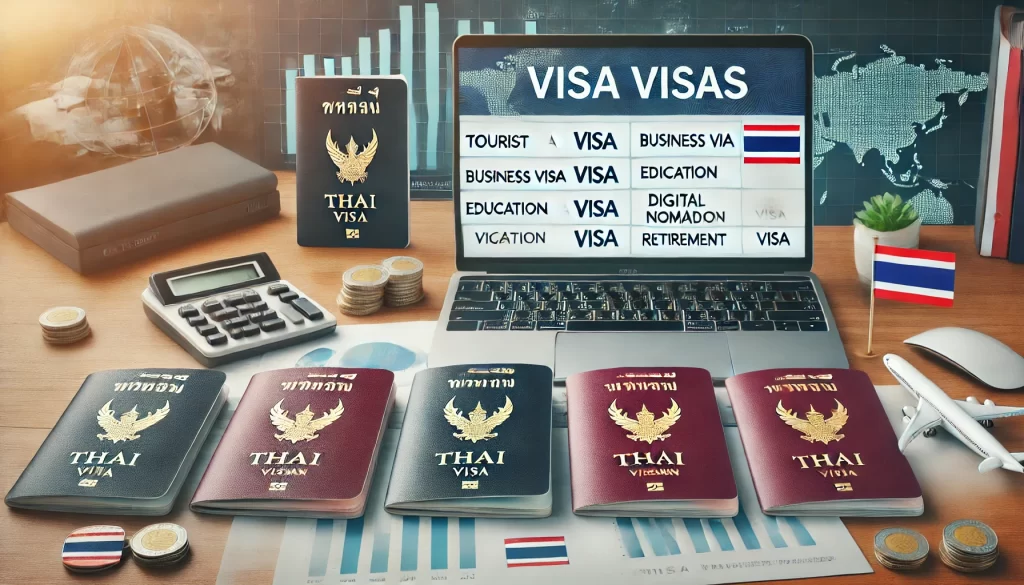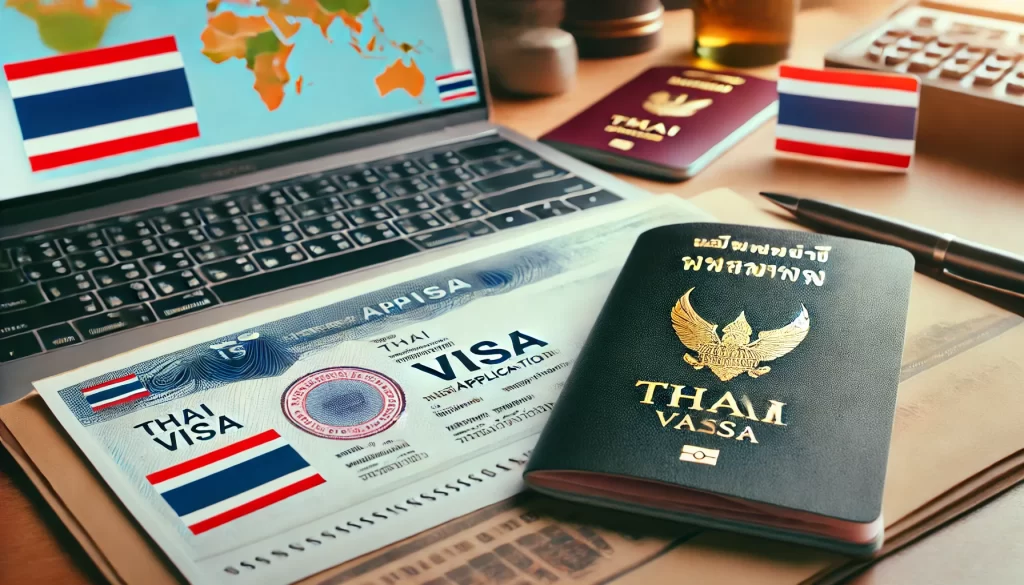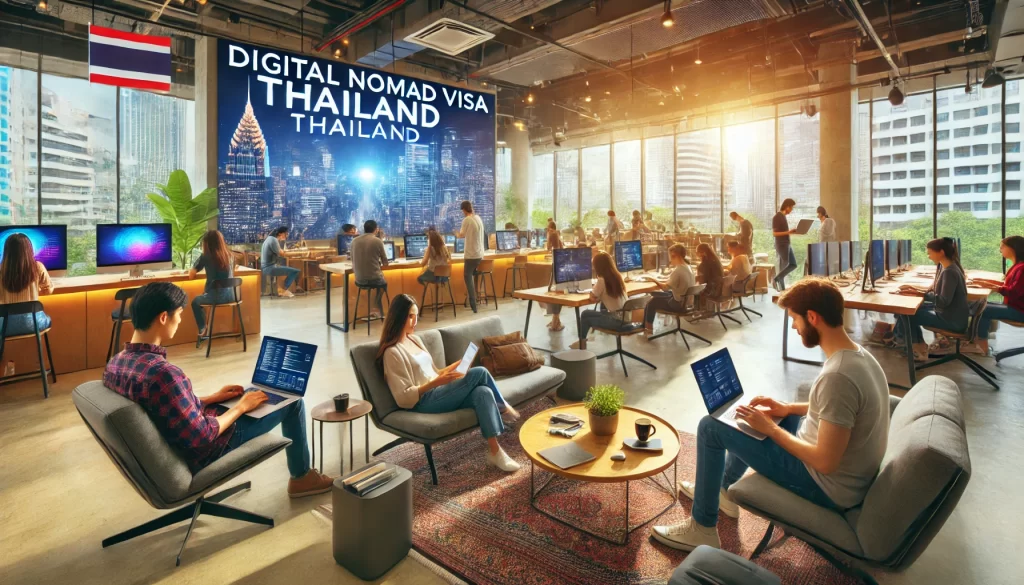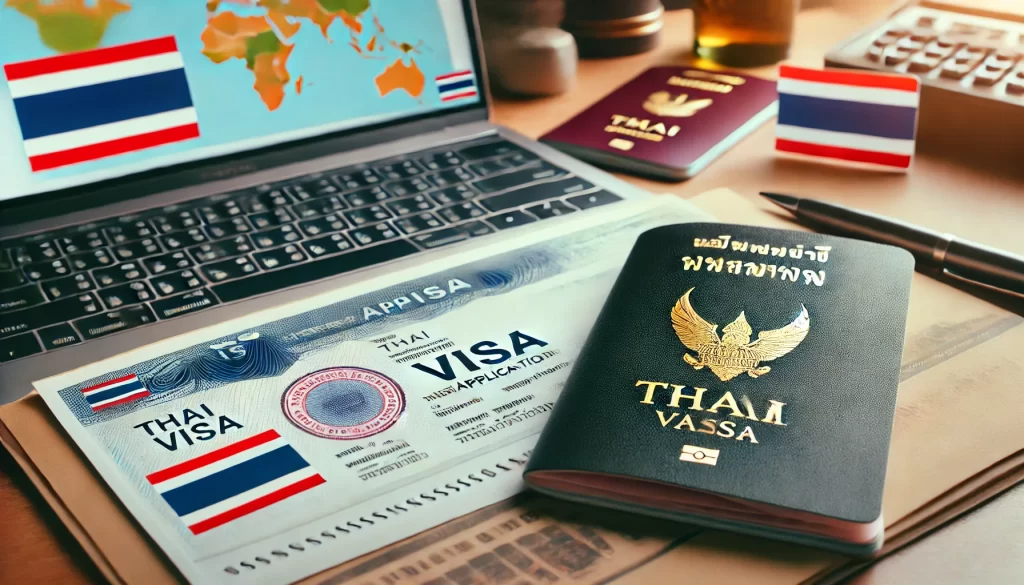
Are you dreaming of pristine beaches, vibrant street markets, and ancient temples? Thailand beckons, but there’s one crucial detail you can’t overlook: your visa. 🇹🇭✈️
Navigating the world of Thai visas can feel like a maze, leaving many travelers confused and overwhelmed. Which visa do you need? How long can you stay? What if you want to work? These questions can turn your tropical paradise dreams into a bureaucratic nightmare. But fear not! We’re here to guide you through the ins and outs of Thai visas, from the various types available to recent policy changes that might affect your plans.
In this comprehensive guide, we’ll explore the different visa options, walk you through the application process, and reveal how to extend your stay in the Land of Smiles. We’ll also delve into work permits and keep you updated on the latest visa policies. So, whether you’re planning a short vacation or considering a long-term stay, buckle up as we embark on a journey through Thailand’s visa landscape!
Types of Visas Available in Thailand

A. Tourist Visa: Explore Thailand’s Wonders
Thailand offers various tourist visa options for travelers seeking to immerse themselves in its rich culture and stunning landscapes. The most common types are:
- Visa on Arrival (VOA)
- Visa Exemption
- Single-Entry Tourist Visa
- Multiple-Entry Tourist Visa
| Visa Type | Duration | Eligibility |
|---|---|---|
| VOA | 15 days | Select countries |
| Visa Exemption | 30-90 days | Specific nationalities |
| Single-Entry | 60 days (extendable) | Most nationalities |
| Multiple-Entry | 6 months (60 days per entry) | Most nationalities |
B. Non-Immigrant Visa: Long-term Stay Options
For those planning an extended stay in Thailand, non-immigrant visas cater to various purposes:
- Education (ED)
- Business (B)
- Marriage (O)
- Volunteer work (O)
These visas typically allow stays of 90 days to 1 year, depending on the category and purpose of visit.
C. Special Tourist Visa: Extended Vacation Opportunities
Introduced in response to the COVID-19 pandemic, the Special Tourist Visa (STV) allows for longer stays:
- Initial 90-day stay
- Extendable twice, each for 90 days
- Total possible stay of up to 9 months
D. Retirement Visa: Enjoy Your Golden Years in Paradise
Thailand’s retirement visa is perfect for those aged 50 and above looking to retire in tropical bliss. Key requirements include:
- Proof of funds (800,000 THB in a Thai bank or monthly income of 65,000 THB)
- Health insurance coverage
- Clean criminal record
This visa is renewable annually, allowing retirees to comfortably settle in Thailand.
Visa Application Process

A. Required Documents: Prepare for Success
To ensure a smooth visa application process for Thailand, gather these essential documents:
- Valid passport (with at least 6 months validity)
- Completed visa application form
- Recent passport-sized photographs
- Proof of accommodation in Thailand
- Flight itinerary or ticket confirmation
- Bank statements (showing sufficient funds)
- Letter of invitation (if applicable)
| Visa Type | Additional Documents |
|---|---|
| Tourist | Travel itinerary |
| Business | Company letter, work permit |
| Education | Acceptance letter, transcripts |
| Retirement | Proof of pension, health insurance |
B. Application Submission: Online vs. In-Person
Online submission offers convenience and time-saving benefits:
- Available 24/7
- Reduces paperwork
- Faster processing times
In-person submission at Thai embassies or consulates:
- Personal assistance
- Immediate document verification
- Suitable for complex cases
Choose the method that best suits your situation and location.
C. Processing Times: Plan Your Trip Accordingly
Visa processing times vary based on the type and method of application:
| Visa Type | Online Processing | In-Person Processing |
|---|---|---|
| Tourist | 3-5 business days | 2-3 business days |
| Non-Immigrant | 5-7 business days | 3-5 business days |
| Special Tourist Visa | 7-10 business days | 5-7 business days |
D. Fees: Budget for Your Thai Adventure
Visa fees depend on the type and duration of stay:
- Tourist Visa: $40 (single entry), $100 (multiple entry)
- Non-Immigrant Visa: $80 (single entry), $200 (multiple entry)
- Special Tourist Visa: $65
Note: Fees are subject to change and may vary by embassy or consulate.
E. Common Pitfalls: Avoid Application Mistakes
- Incomplete application forms
- Insufficient funds in bank statements
- Expired passport or insufficient validity
- Unclear or non-compliant photographs
- Missing supporting documents
Double-check all requirements before submitting your application to prevent delays or rejections. With careful preparation and attention to detail, you’ll be well on your way to exploring the wonders of Thailand.
Extending Your Stay in Thailand

Visa Extensions: Prolong Your Thai Experience
Extending your stay in Thailand is a common desire for many visitors. The process of visa extension allows you to remain in the country legally beyond your initial visa duration. Here’s what you need to know:
Where to extend:
- Immigration offices in major cities
- Bangkok Immigration at Chaengwattana
- Provincial immigration offices
Required documents:
- Passport with current visa
- TM.7 extension form
- Recent 4x6cm photograph
- Proof of accommodation (TM.30 form)
- Extension fee (1,900 THB for most visas)
| Visa Type | Maximum Extension | Requirements |
|---|---|---|
| Tourist Visa | 30 days | Proof of funds (20,000 THB per person) |
| Non-Immigrant Visa | Varies by category | Additional supporting documents |
| Education Visa | Up to 1 year | Enrollment letter from institution |
Visa Runs: Explore Neighboring Countries
A visa run involves leaving Thailand to obtain a new entry stamp or visa. This option allows you to:
- Reset your permitted stay
- Explore nearby countries
- Potentially obtain a new visa type
Popular visa run destinations:
- Malaysia (Penang, Kuala Lumpur)
- Laos (Vientiane)
- Cambodia (Siem Reap, Phnom Penh)
- Singapore
Overstay Penalties: Stay Legal and Avoid Fines
Overstaying your visa in Thailand can lead to serious consequences. It’s crucial to understand the penalties:
- Daily fine: 500 THB per day (capped at 20,000 THB)
- Potential ban from re-entering Thailand
- Risk of detention and deportation
To avoid overstay:
- Set reminders for visa expiration
- Plan extensions or visa runs in advance
- Consult with immigration offices for accurate information
Remember, staying legal ensures a worry-free experience in the Land of Smiles. Next, we’ll explore the intricacies of working in Thailand and the necessary visa requirements for employment.
Working in Thailand

Work Permit Requirements: Navigate the Process
Obtaining a work permit in Thailand is a crucial step for foreigners seeking employment. The process involves several key steps:
- Job offer from a Thai employer
- Non-Immigrant B Visa application
- Work Permit application
To simplify the process, here’s a breakdown of the requirements:
| Requirement | Description |
|---|---|
| Valid passport | Must have at least 6 months validity |
| Non-Immigrant B Visa | Obtained from Thai embassy or consulate |
| Job offer letter | From a registered Thai company |
| Educational certificates | Relevant to the job position |
| Health certificate | Issued within 3 months |
| Photos | Recent 3×4 cm size |
| Application forms | Completed and signed |
Business Visa Options: Opportunities for Entrepreneurs
Thailand offers various business visa options for entrepreneurs:
- Non-Immigrant B Visa: For conducting business or working
- Board of Investment (BOI) Visa: For investors in promoted industries
- Smart Visa: For highly skilled professionals and investors
Each visa type has specific requirements and benefits. The Smart Visa, for instance, offers longer stay periods and work permit exemptions for qualified applicants.
Teaching English: TEFL Certification and Visa Guidelines
Teaching English is a popular option for foreigners in Thailand. To teach legally:
- Obtain a TEFL (Teaching English as a Foreign Language) certification
- Secure a job offer from a Thai school
- Apply for a Non-Immigrant B Visa
- Get a work permit through your employer
TEFL certification typically requires:
- Bachelor’s degree (in any field)
- Native English proficiency or high TOEIC/IELTS scores
- Completion of a recognized TEFL course (online or in-person)
Remember, working without proper documentation can result in fines or deportation. Always ensure you have the correct visa and work permit before starting any employment in Thailand.
Thai Visa Policies and Recent Changes

COVID-19 Impact: Adapting to New Regulations
The COVID-19 pandemic significantly reshaped Thailand’s visa policies, introducing new regulations to balance public health concerns with tourism needs. The government implemented measures such as:
- Mandatory health insurance coverage
- COVID-19 testing requirements
- Quarantine periods for arrivals
These changes aimed to safeguard both visitors and residents while gradually reopening the country to international travelers.
| Pre-COVID | Post-COVID |
|---|---|
| No health insurance requirement | Mandatory health insurance |
| No COVID testing | COVID testing for entry |
| No quarantine | Quarantine periods (varying durations) |
Long-term Resident Visa: Attracting Global Talent
Thailand introduced the Long-term Resident (LTR) visa to attract high-potential foreigners. This program targets four key groups:
- Wealthy global citizens
- Wealthy pensioners
- Work-from-Thailand professionals
- Highly-skilled professionals
The LTR visa offers several benefits:
- 10-year renewable visa
- Fast-track service at international airports
- 90-day reporting replaced with annual reporting
- Digital work permit
Digital Nomad Visa: Embracing Remote Work Culture
Recognizing the growing trend of remote work, Thailand is developing a dedicated Digital Nomad visa. This initiative aims to:
- Attract digital professionals
- Boost local economies
- Position Thailand as a hub for digital nomads
Key features of the proposed Digital Nomad visa include:
- Extended stay periods
- Simplified tax regulations
- Access to co-working spaces and networking events
These visa policy changes reflect Thailand’s adaptability and commitment to remaining an attractive destination for various types of international visitors and residents.

Thailand offers a variety of visa options to cater to different travel purposes and durations of stay. From tourist visas to work permits, understanding the available choices and application processes is crucial for a smooth experience in the Land of Smiles. Recent changes in Thai visa policies have aimed to streamline procedures and attract long-term visitors, making it easier for many to extend their stay or work in the country.
As you plan your journey to Thailand, take the time to research and select the most appropriate visa for your needs. Whether you’re visiting for leisure, business, or considering a longer-term stay, being well-informed about visa requirements and regulations will help ensure a hassle-free and enjoyable time in this beautiful Southeast Asian nation. Remember to stay updated on any new visa policies and always consult official sources for the most accurate and current information.

